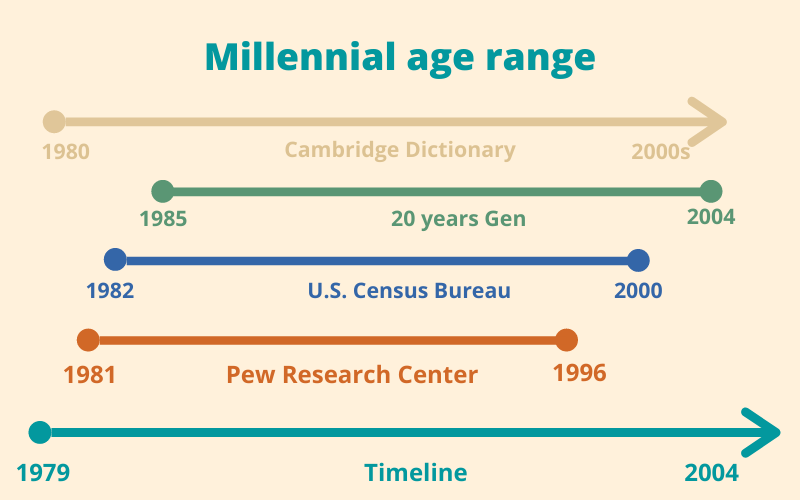According to the U. S. Census Bureau, millennials are those people born between 1982 and 2000. This means that the millennials’ age range in 2024 is between 42 and 24 years old.
According to this institute, a “generation” is a group of cohorts (people birth in a particular year) that share a statistically meaningful demographic event.
How old are millennials? Am I one of them? Which are the millennials years? These are endless questions! How many of us have had this debate after dinner with friends? I guess many. So, the discussion is so long because there’s little consensus about when each generation begins and ends.
Therefore, there are several points of view about the millennials’ age range, which is a more complicated generation to define. After all, we are so close in historical terms.
Generation calculator
Fill in the year of birth to find out your generation
Millennials age range graph
In this graph you see per institute the age range when millennials are born.

How old are millennials in 2024?
There is not a unified criterion about the millennials age range. But we will tell you the most important and accurate proposals to answer this question.
From a cultural perspective, a “generation” is a group of people that share-alike life experiences. So then, what are millennials known for? First, growing in a period of accelerated changes, led by the rapid technological developments.
Another big name in these demographic studies is the Pew Research Center. This think tank states a shorter period of birth time for this generation. According to them, millennials were born between 1981 and 1996. If we follow this theory, the millennials’ age range in 2024 is anyone between 43 and 28 years old.
The idea behind this is that millennials have been old enough to live and understand 9/11 and experience the 2008 crisis in their first experiences in the labour market.
Another definition for the millennial generation
There are other examples with earlier proposals about this definition, such as George Masnick, a professor at Harvard University. He said as early as 2012 that millennials were those who were born between 1985 and 2004. So from this point of view, millennials’ age range in 2024 is between 39 and 19 years old.

He has some good reasons for this cutoff, which is very different from the other proposals. First, he says that making generation spams of 20 years makes it easier to compare between generations.
Secondly, he states that the 1985 kick-off was chosen since this was the year when the United States births once again exceeded 3.7 million, defining the end of the meagre birth rate which characterized Generation X.
He gives three reasons for the cutoff in 2004. First, he points out that after 2005 three significant changes made a significant turn in young adults’ lives. These are the outburst of social media, the Great Recession’s substantial impact on early working life, a tremendous unemployment rate, and the exponential growth of students’ debt from 2005.
Millennials meaning
To make it more confusing, the Cambridge Dictionary, which properly collects new words or new words senses, defines a millennial as “a person who was born in the 1980s, 1990s, or early 2000s”. But what else does it say to define millennials? This is what the dictionary says:
“Millennials have grown up with the internet and can’t imagine a world without it”, which indicates that they use technology as the central aspect to consider.
Millennials characteristics
Some other demographic, cultural, political and economic millennials characteristics, according to Goldman & Sachs (taking the 1982-2000 cutoff years), are:
• They are the first digital natives. And stay connected more, having more expansive access to information online. We revise some discussions about this topic on the section Generation Z.
• Millennials are the largest generation in America, with about 92 million people.
• Millennials take way more personal care than previous generations (eating better food, sporting more, and choosing a healthier lifestyle).
• Millennials choose to have access to goods than owing them. This is related to the sharing economy, in which millennials participate intensely, sharing cars, offices and even houses.

Happy to be part of this generation? Now some not-so-happy numbers. When you compare millennials economic situation with the conditions of previous generations when they were the same age:
• Millennials have lower salaries.
• Millennials have a higher student loan.
• Millennials stay living at their parents’ house for longer years (because they can not afford to live on their own).
• Millennials delay marriage and having kids.
• Millennials are the generation that listens the most to podcasts. Go to Play Podcast if you want to listen yourself to podcasts.
But let us finish this with a smile; the most popular definition in the cooperative website Urban Dictionary quotes millennial as “Name an old person gives a young person they don’t like.”
Millennials in the workspace

Millennials in the workspace are the majority group. Approximately 92 million millennials are working in the United States. Because of this, they have a lot of influence on the labor market trends and could even determine most of the labor laws.
Most millennials have a positive attitude, value interesting jobs and aim to achieve an excellent work-life balance. Many of them like spending time with their children (the Alpha generation); they accomplish this by working shorter hours than the previous generations but measuring their worth according to the value created, which they can improve with the proper use of technology.
Despite their positive attitude towards work, most millennials are not loyal to one particular company, and it is more common than not to find a millennial seeking a new job while still employed.
Spainsolareclipse.com Don't miss the Solar Eclipse 2026 in Spain
